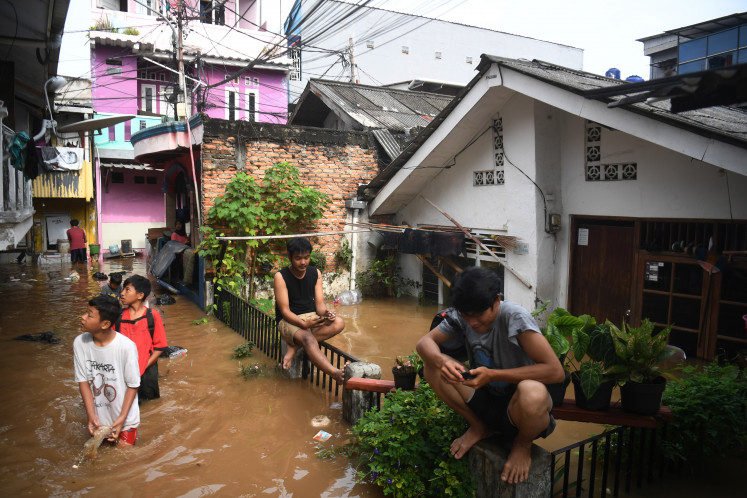Popular Reads
Top Results
Can't find what you're looking for?
View all search resultsPopular Reads
Top Results
Can't find what you're looking for?
View all search resultsLengthy AGO investigation leads to ARV drug shortage
A shortage of antiretroviral (ARV) drugs in dozens of cities and regencies across the country has raised public concerns, prompting a civil society group to demand that the Attorney General’s Office (AGO) speed up its investigation into alleged corruption in the government’s procurement of the medication
Change text size
Gift Premium Articles
to Anyone

A
shortage of antiretroviral (ARV) drugs in dozens of cities and regencies across the country has raised public concerns, prompting a civil society group to demand that the Attorney General’s Office (AGO) speed up its investigation into alleged corruption in the government’s procurement of the medication.
Indonesia AIDS Coalition (IAC) director Aditya Wardhana criticized the AGO, saying it had not done enough to settle the case after more than a year of investigating.
“The attorney general must be firmer. [The AGO] should find out whether corruption was found in this case,” Aditya told The Jakarta Post on Tuesday.
If there was evidence of corruption, he added, the AGO should name a suspect and continue with the legal process.
“Even if the AGO found no evidence [of corruption], the office should at least issue an SP3 [investigation termination warrant] so that the Health Ministry can procure the [ARV drugs],” Aditya said.
He believes that the unfinished investigation, which started in 2016, had made the Health Ministry extra cautious about procuring ARVs, and this has led to a shortage.
Based on IAC findings, at least 40 regencies and cities currently face ARV shortages.
However, a Health Ministry official has assured that the ministry had started procuring the drugs.
The Health Ministry’s director general for pharmacy and medical equipment, Engko Sosialine Magdalene, said the purchase and distribution of ARV drugs for this year had already been completed and distribution had started on Monday.
Among the ARV drugs that were purchased are Tenofovir and Emtricitabine, as well as Tenofovir, Lamivudine and Efavirens (TLE). They are expected to last 12 months.
According to a document circulated among activists living with HIV/AIDS (ODHA), the Health Ministry's communicable disease prevention and control director, Wiendra Waworuntu, had requested from the ministry’s pharmacy and medical equipment division the purchase of 77,695 bottles of a fixed-dose combination of Tenofovir and Emtricitabine, as well as 653,970 bottles of a fixed-dose combination of TLE.
The ministry has not responded to the Post’s questions about the authenticity of the document.
Through its cost structure analysis, IAC also estimated that the state could lose more than Rp 150 billion (US$10.44 million) from inefficiencies in the drugs’ procurement in 2016.
At that time, the government bought the drugs for Rp 400,000 (per bottle for 30 days), while in the international market, they were sold for around Rp 115,000, Aditya said.
Until recently, only two companies are authorized by the Health Ministry to import ARV drugs, namely PT Kimia Farma and PT Indofarma. They import a fixed-dose combination of TLE.
The government has failed in securing tenders with the companies at least twice in the last two years.
In the meantime, Semarang-based pharmaceutical company PT Sampharindo Retroviral Indonesia has started producing several types of ARVs in February: Telavir, a type of TLE; and Telado, a fixed-dosed combination of Tenofovir, Lamivudine and Dolutegravir.
However, the companies have only secured a permit from the Food and Drug Monitoring Agency (BPOM) to produce the drugs and has not been authorized to sell to the government.
The AGO has so far questioned 31 people in the alleged irregularities, but it has yet to name a suspect or halt the investigation.
“The investigation is ongoing,” AGO spokesman Heri Setiyono told the Post on Tuesday but declined to go into detail.
According to the office’s website, the latest interview conducted in relation to the case was on Sept. 4, 2019. At that time, the AGO investigation unit questioned Baharuddin, then-president director of PT Indofarma Global Medika and Tulus Wariono, then-accounting manager of Kimia Farma.
The AGO alleged there were irregularities in the 2016 procurement of ARV drugs by the Health Ministry’s public drug management directorate, which caused state losses.
In 2016, Kimia Farma secured a Rp 211 billion contract for the procurement of ARVs through a public tender. Meanwhile, Indofarma, as the tender for the second phase of the procurement, secured a contract worth Rp 85 billion. But the tender process of both companies allegedly violated regulations for the procurement of government goods and services.
This is not the first time that discrepancies in the procurement of ARV drugs have landed the ministry in hot water.
According to the Supreme Audit Agency’s (BPK) assessment into the health ministry’s 2018 budget report, up to Rp 2.8 billion worth of ARV drugs had expired before they were distributed, and an additional Rp 90.4 billion worth of drugs had expired by August 2019.









